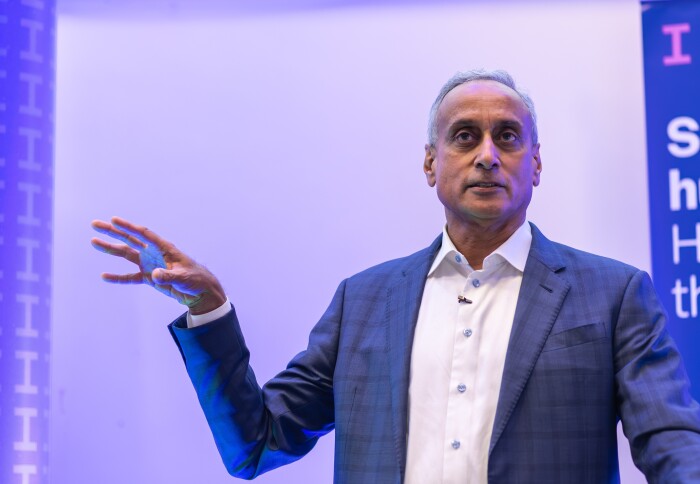Google’s Dr Prabhakar Raghavan Discusses AI’s Future at Imperial

Dr Prabhakar Raghavan, Google’s Chief Technologist, gave a lecture at Imperial on AI’s potential, ethics, and future innovations
Imperial College London recently welcomed Dr Prabhakar Raghavan, Google’s Chief Technologist and Senior Vice President, for a distinguished guest lecture on the future of artificial intelligence (AI) and search technology. Held in the Sir Alexander Fleming Building, the event drew a large and enthusiastic audience from across the University, bringing together students, staff, and prominent figures from the tech and academic communities. Organised by Imperial’s School of Convergence in Human and Artificial Intelligence as part of its "Science for Humanity" strategy, the lecture highlighted the role of universities in addressing the societal challenges presented by advanced AI.
Professor Hugh Brady, Imperial’s President, opened the event by introducing the university’s new "Science for Humanity" strategy, which emphasises the role of interdisciplinary research in addressing pressing global issues. Frontier AI, as part of this broader vision, will be supported by the forthcoming Schools of Convergence Science. He discussed how Imperial is increasingly collaborating with industry and government to enhance AI safety, improve data and information quality, and create practical applications for AI across sectors, aiming to make an impact on innovation, societal decision-making and competitiveness.
From the History of the Search Engine to AI's Transformative Potential: A Broader View
Dr Prabhakar Raghavan, Google’s Chief Technologist and Senior Vice President, brought a wealth of experience from both academia and industry to his lecture on the development of the search engine to emergent AI’s potential - with a focus on both technical challenges and ethical responsibilities. With a background that spans leadership roles in major tech companies—where he advanced search and machine learning at Yahoo! Labs and Verity before joining Google—Dr Raghavan spoke from deep academic and technical expertise. He transitioned from a distinguished academic career to leading one of Google’s most critical divisions, focusing on AI-driven advancements in search technology.

In his talk, Dr Raghavan highlighted AI’s transformative potential while urging caution regarding the ethical complexities it introduces. He noted that as AI technologies continue to progress, a gap persists between what users expect from AI and its current technical limitations, stressing that both developers and users need a sound understanding of these capabilities and boundaries. Fostering “AI literacy” is essential, he argued, to ensure responsible and informed use—a view that aligns with broader educational and collaborative initiatives in the field.
Dr Raghavan discussed the ways AI might reshape information discovery, moving beyond static search methods to create interactive, personalised discovery experiences that could revolutionise how knowledge is accessed and utilised. His insights echoed a shared commitment across institutions to develop technologies that responsibly serve society, benefiting fields like education, healthcare, and environmental science.
Striking a Balance for the Future
In his closing remarks, Dr Raghavan highlighted the need for creators, platforms, and AI developers to strike a balance between freedom and responsibility. Responsible use of AI can foster a transparent, trust-based relationship between users and technology, ensuring AI serves as a beneficial tool rather than a source of misinformation or harm.
Professor Hugh Brady, Imperial’s President, echoed these sentiments, emphasising the importance of partnerships between academia and industry in developing responsible AI. He remarked, “Through our partnerships with leaders like Google, we’re not only pushing the boundaries of technological innovation but also co-creating standards for ethical and responsible AI. This is the essence of our Science for Humanity strategy—ensuring that AI serves the greater good across health, the environment, and beyond.”
A Collaborative Vision for AI’s Future
The event concluded with a Q&A session, moderated by Professor Mary Ryan, Imperials Vice Provost for Research and Enterprise, which offered students an opportunity to engage with Dr Raghavan and learn more about his own journey, from academia to industry leadership.
“We are already seeing a rapid deployment of AI in the innovation sphere. The next frontier in AI development needs to encompass enhancing transparency and accountability, to enable rapid and responsible deployment that can accelerate progress" Prof Mary Ryan Vice Provost (Research and Enterprise)
Reflecting on the future of AI, Professor Mary Ryan concluded, “We are already seeing a rapid deployment of AI in the innovation sphere. The next frontier in AI development needs to encompass enhancing transparency and accountability, to enable rapid and responsible deployment that can accelerate progress. Our network of over 1000 researchers working in AI are already developing new tools and approaches to ensure ethical deployment of AI for global benefit”
The lecture reinforced the importance of interdisciplinary research and accountability in AI development. Dr Raghavan’s insights, combined with ongoing collaboration between academia, industry, and government, offer a promising path forward for AI that serves the public good.
Article text (excluding photos or graphics) © Imperial College London.
Photos and graphics subject to third party copyright used with permission or © Imperial College London.
Reporter
Caitlin O'Shea
Office of the Provost




